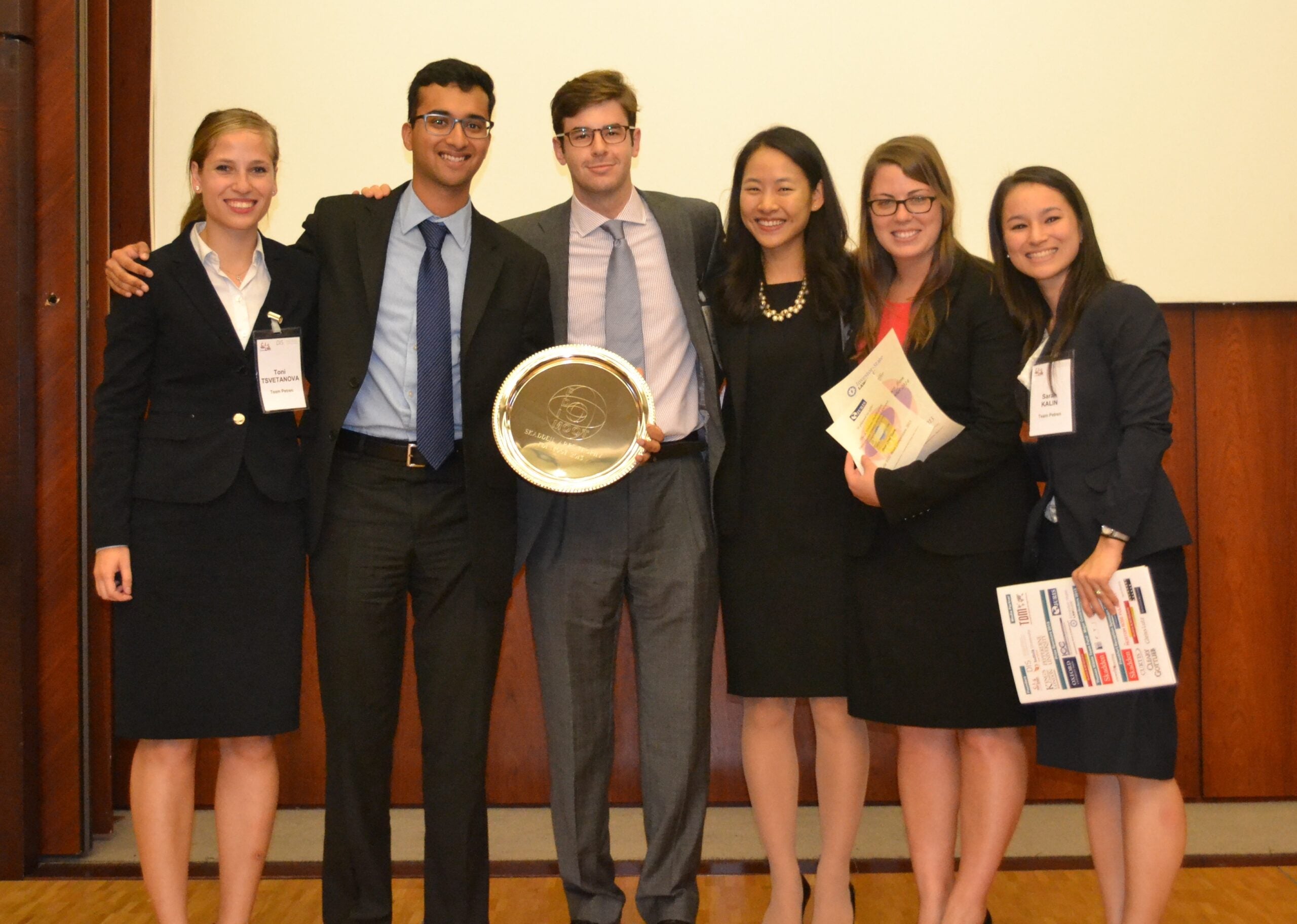A team of students from Harvard Law School was awarded the 2013 Skadden, Arps Trophy for winning first place at the Foreign Direct Investment International Arbitration Moot competition, which took place at the Frankfurt International Arbitration Center, in Germany, in October.
The Harvard Foreign Direct Investment Moot Court Team consisted of Rajarshi Banerjee ’14, Mitchell Moranis ’14, Toni Tsvetanova ’15, Sarah Weiner ’15 and team co-captains June Hwang ’14 and Sarah Kalin ’14. Banerjee and Moranis, as the primary oralists, argued a total of eight and seven times, respectively, leading the team to victory against Monash University of Australia in the final round.
In total, 72 teams took part in the competition’s various regional rounds, with 47 schools participating in the oral hearings in Frankfurt. This is the second year that Harvard participated in the competition. Last year the team came in Third Place.
The FDI Moot Arbitration competition spans approximately six months in two phases: written memorials for claimant and respondent, and the hearing of oral arguments. The competition provides students an opportunity to get hands-on experience dealing with a hypothetical Investor-State arbitration dispute. This year’s problem raised issues relating to investment planning, the tension between the state’s power to introduce new measures to protect public health and its bilateral investment treaties obligation, interaction between intellectual property rights and investment law, and damages recoverable by the investor.
“Working on this problem with our team for the past eight months has been a tremendously rewarding and fun experience,” said Kalin. “We learned a great deal, not only from each other, but also from other graduate students, academics and practitioners. As a result of this combined team effort, we hopefully were able to add to the discussion on some of the field’s most challenging and current legal questions.”
Several of this year’s team members were students in last year’s International Investment Law seminar taught by Harvard Law School Professor Mark Wu. Wu, along with William Burke-White ’02, deputy dean and professor of law at University of Pennsylvania, helped moot and prepare students for the competition. Jeswald Salacuse ’63, a member of Harvard Law School’s Program on Negotiation’s executive committee and the Henry J. Braker Professor of Law at Tufts University Fletcher School of Law and Diplomacy, served as the team’s faculty advisor.
During the competition, Harvard faced teams from around the world, including the National Law University of Jodhpur, the Russian Academy of Justice, Judicial Research & Training Institute of Korea, and the University of Warsaw.
“What made this experience particularly rewarding for me is that we got to compete against, and before, people from all over the world,” said Banerjee. “We learned that arguments and approaches that might work in the United States may not work in Germany, Nigeria, India or Australia. Legal practice is becoming increasingly globalized, making opportunities such as the FDI Moot invaluable.”
According to Banerjee, the team’s diversity helped win the global competition. “Our team members come from Bulgaria, Canada, India, Korea, Switzerland and the United States,” he said. “Our interests range from international development and intellectual property to commercial arbitration, project finance and tax. Our different perspectives helped us tackle what the FDI Moot organizers noted was a really complex problem.”
This year’s team members agreed that taking part in a moot competition was a tremendous learning opportunity.
“Preparing for the FDI Moot was one of the most fun and rewarding experiences I’ve had in law school,” said Hwang. “It required a lot of intellectual rigor and creativity in thinking about complex legal issues, and I learned so much from my fellow teammates and some amazing scholars in the HLS community along the way.”
Moranis added, “What made the experience so special for me was the team. From writing our memorials to making last second adjustments before the final round of arguments, everyone supported each other and we had a ton of fun. We were also incredibly lucky to have faculty and other students who were so generous with their time and expertise.”
